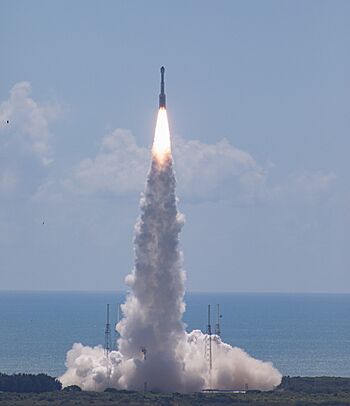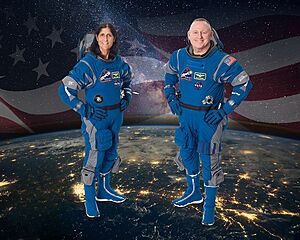Boeing Crewed Flight Test facts for kids

Boeing Starliner Spacecraft 3 Calypso launches on the Crew Flight Test atop an Atlas V rocket
|
|
| Names | Boe-CFT |
|---|---|
| Mission type | Test flight |
| Operator | Boeing Defense, Space & Security |
| Mission duration | 630 days, 15 hours and 43 minutes ~8 days (planned) |
| Spacecraft properties | |
| Spacecraft | Boeing Starliner Spacecraft 3 Calypso |
| Spacecraft type | Boeing Starliner |
| Manufacturer | Boeing Defense, Space & Security |
| Crew | |
| Crew size | 2 |
| Members | |
| Start of mission | |
| Launch date | 5 June 2024, 14:52:14 UTC |
| Rocket | Atlas V N22 |
| Launch site | Cape Canaveral, SLC-41 |
| Contractor | United Launch Alliance |
| End of mission | |
| Landing date | TBD |
| Landing site | TBD |
| Orbital parameters | |
| Reference system | Geocentric orbit |
| Regime | Low Earth orbit |
| Inclination | 51.66° |
| Docking with International Space Station | |
| Docking port | Harmony forward |
| Docking date | 6 June 2024, 16:15 UTC (Planned) |
| Undocking date | TBD |
| Time docked | TBD |
 Williams (left) and Wilmore (Right) Commercial Crew Development
|
|
The Boeing Crew Flight Test (Boe-CFT) is a very important space mission. It is the first time the Boeing Starliner spacecraft has carried astronauts into space. This mission is also the third test flight for the Starliner. Before this, there were two uncrewed test flights, called Boe-OFT in 2019 and Boe-OFT 2 in 2022.
This mission will take two NASA astronauts, Barry E. Wilmore and Sunita Williams, to the International Space Station (ISS). They will spend about a week there. After their stay, the crew will return to Earth, landing on land in the southwestern United States. The Starliner spacecraft was connected to its Atlas V rocket on April 16, 2024, getting ready for launch.
The mission was first planned for 2017. But it faced many delays. Problems with the parachute system and wiring caused it to be pushed back. The launch was finally successful on June 5, 2024.
Contents
About the Starliner Spacecraft
The Starliner spacecraft used for this mission is named Calypso. This is its second trip to space. Calypso was first used for the very first uncrewed test flight.
After its first flight, NASA and Boeing prepared Calypso for this crewed mission. They checked everything carefully. New parachutes and airbags were added to the capsule. The part of the capsule that connects to the space station was also changed. This was to fit a new cover used when the capsule comes back to Earth.
Meet the Astronauts
This mission has two experienced NASA astronauts. They are Barry E. Wilmore and Sunita Williams. They are the first crew to fly on the Starliner spacecraft.
Originally, other astronauts were planned for this mission.
- Nicole Aunapu Mann was first assigned. She would have been the first woman to fly on a new crewed spacecraft's first flight. But she was moved to another mission, SpaceX Crew-5.
- Eric Boe was supposed to be the pilot. He was replaced by Michael Fincke due to medical reasons.
- Chris Ferguson, a Boeing astronaut, was the original commander. He was replaced by Barry E. Wilmore for family reasons.
In 2022, NASA confirmed that Wilmore and Williams would be the two astronauts for this test flight. Michael Fincke is training as a backup pilot. Sunita Williams is the first woman to fly on the first crewed flight of a new type of orbital spacecraft.
| Position | Crew member | |
|---|---|---|
| Spacecraft Commander | Third spaceflight |
|
| Pilot | Third spaceflight |
|
| Position | Crew member | |
|---|---|---|
| Spacecraft Commander | ||
The Mission Plan
The Atlas V N22 rocket launched the Starliner with its two astronauts. The spacecraft will travel to the International Space Station and connect to it. After their time on the ISS, the astronauts will return to Earth. They will land on land in the southwestern United States.
A fun fact: The crew uses a toy narwhal, also named "Calypso," as a zero-gravity indicator. This means when the narwhal starts floating, they know they have reached weightlessness in space!
This flight is special for a few reasons:
- It's the first time a crewed spacecraft has launched on an Atlas V rocket.
- It's the first crewed launch using an Atlas rocket since the 1960s Project Mercury missions.
- It's the first crewed launch from Cape Canaveral Space Force Station since Apollo 7 in 1968.
The mission is planned to be short. This is enough time to test if the Starliner can safely carry astronauts to and from the space station. NASA might extend the mission if needed.
Landing on Land
The Starliner will make a ground landing. This is the first time a crewed capsule launched from the United States will land on land. When the capsule comes back through Earth's atmosphere, three parachutes will open. They will slow the capsule down to about 4 miles per hour. Just before landing, six airbags will inflate. These airbags will cushion the landing.
There are four main landing spots for the Starliner:
- Two sites inside the White Sands Missile Range in New Mexico.
- The Willcox Playa in Arizona.
- The Dugway Proving Ground in Utah.
Edwards Air Force Base in California is also ready as a backup landing spot.
Launch Attempts
The launch of Boe-CFT faced a few delays before its successful liftoff:
- First attempt (May 7, 2024): The launch was stopped about two hours before liftoff. There was a problem with an oxygen valve on the Atlas V rocket.
- Second attempt (June 1, 2024): This attempt was stopped just minutes before launch. A computer problem on the ground caused the delay.
- Third attempt (June 5, 2024): This launch was successful!
| Attempt | Planned | Result | Turnaround | Reason | Decision point | Weather go (%) | Notes |
|---|---|---|---|---|---|---|---|
| 1 | 6 May 2024, 10:34:00 pm | Scrubbed | — | Centaur LOX valve issue | 6 May 2024, 8:32 pm (T-02:01:30) | 95 | |
| 2 | 1 Jun 2024, 12:25:40 pm | Scrubbed | 25 days, 13 hours, 52 minutes | Ground launch sequencer computer fault | 1 Jun 2024, 12:22 pm (T-00:03:35) | 90 | |
| 3 | 5 Jun 2024, 10:52:14 am | Success | 3 days, 22 hours, 27 minutes | 90 |
See Also
 In Spanish: Boe-CFT para niños
In Spanish: Boe-CFT para niños
- Commercial Crew Development
- SpaceX Dragon 2
- Crew Dragon Demo-2, SpaceX's first crewed mission of their capsule
 | Precious Adams |
 | Lauren Anderson |
 | Janet Collins |

